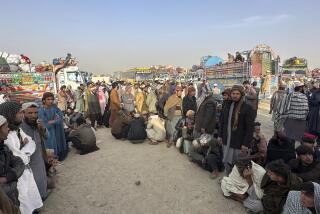Afghan Exiles Plan Strategy to Oust Taliban
PESHAWAR, Pakistan — In a heavily guarded walled compound here, Haji Mohammed Zaman presided Thursday over a war council of 100 black-bearded Pushtun commanders who may hold the key to the future of Afghanistan.
Expelled from his Pakistani base in 1997 because of his activities against Afghanistan’s Taliban regime, Zaman has spent the last four years as a political refugee in France. On Thursday, Zaman was back in Peshawar at the invitation of the same Pakistani government that kicked him out.
As armed sentries patrolled the ramparts, Zaman instructed his commanders to go home to Afghanistan and persuade Taliban fighters to give up their posts or face the wrath of a renewed and rearmed opposition backed by U.S. firepower.
“We will ask the Taliban to surrender political power,” Zaman said. “If they don’t, we will go after them.”
His commanders made a wish list of what they wanted for the job: rocket launchers, surface-to-surface missiles, long-range cannons, crates of Kalashnikov assault rifles--and lots of cash. As part of the U.S. campaign to overthrow the Taliban regime and flush out Osama bin Laden, Washington has made it clear that it is willing to pay practically any price.
The extraordinary meeting Thursday morning in this dusty frontier city represented an early milestone in the U.S.-backed attempt to construct a viable alternative to the Taliban in the important borderland, dominated by ethnic Pushtuns, where the fundamentalist regime still enjoys its strongest support.
As the Northern Alliance and Iranian-backed fighting units converge on Kabul, the Afghan capital, from the north and west, the Taliban still has space for a strategic retreat to the south unless a Pushtun resistance force can be raised to meet it.
The local commanders at the meeting Thursday were from two eastern Afghan provinces, Nangarhar and Konar, but more such meetings of commanders from other provinces are expected in coming days as opposition leaders rush to assemble a post-Taliban ruling council under the banner of exiled 87-year-old former Afghan monarch Mohammad Zaher Shah.
Key to the success of the effort is the recruitment of anti-Taliban and moderate Taliban Pushtuns, the largest ethnic group in Afghanistan.
The task is complicated by a four-year Pakistani policy supporting the Taliban that was reversed under U.S. pressure after the Sept. 11 attacks on America.
After the Taliban swept into power in 1996, Pakistan expelled hundreds of anti-Taliban leaders based in Peshawar and other border cities as a demonstration of its support for the new regime. Along with its extreme religious views, the Taliban movement brought a degree of stability to the region that was appreciated by the Pakistani government, which fears instability along its 1,500-mile western border.
But with the U-turn in Pakistani policy, these former personae non gratae are now most-favored guests.
Sprinkled among the crowd at the Peshawar compound were observers from the Pakistani intelligence services. “You will notice that there are journalists here not taking notes,” one of the attendees, a Pakistani journalist, said with a smile.
Zaman, who had commanded 4,000 moujahedeen fighters in the eastern Afghan city of Jalalabad during the 1980s anti-Soviet uprising, had been given 48 hours to get out of Pakistan. The blacklist ended Sept. 11. Getting back into Pakistan this time was a snap, Zaman said. “I just went to the Pakistan Embassy, and they gave me a visa,” he said.
Zaman, who speaks limited English and French in addition to his native Pushtu, was grateful for the newfound U.S. interest in his cause. But, like others in the Afghan refugee community, he was bitter that it took something as serious as the terrorist attacks to get America’s attention.
After the Soviet Union withdrew from Afghanistan in 1989, Zaman said, “Americans just walked away from us and left Afghanistan to suffer. They actually facilitated Osama bin Laden coming in. Now the Americans are suffering themselves for the first time. To alleviate their pain, they have come to our rescue.”
Among the commanders who attended the meeting Thursday was Rostom Sherzad, 38. Sherzad and three other tough-looking colleagues from the Khugiani district of Nangarhar province said they crossed the border illegally after paying Pakistani border agents the equivalent of $8 each.
Sherzad said he commands about 120 men. When the Taliban seized control of his territory near Jalalabad, Sherzad said, he and his men went into a dormant state.
Responding to a Taliban request for weapons, he said, they turned in 37 Kalashnikovs. But he said they hid 70 other guns. The hoarding of weapons could prove to be a significant factor in the coming struggle.
Sherzad said the people in his area are fatigued by the “narrow-minded” religious orthodoxy of the Taliban. For four years, he said, he has been “waiting for instructions from Haji Zaman” to rise up against the regime.
Several of the Afghan commanders said they were impressed by the accuracy of the U.S. bombing campaign in Afghanistan. They said Taliban estimates of civilian casualties were exaggerated.
Because of the bombing, said a commander who asked not to be identified because of possible danger to his family, villagers have taken to asking the Taliban to leave, lest they become targeted.
“Only the top leaders remain loyal to the Taliban,” the commander said.
Among those in the Jalalabad area, he said, are 500 to 600 Arabs and Chechens who are part of the international brigade recruited by Bin Laden into Afghanistan.
“They come into town in their pickups to shop in the market,” Sherzad said. “Then they disappear.”
More to Read
Sign up for Essential California
The most important California stories and recommendations in your inbox every morning.
You may occasionally receive promotional content from the Los Angeles Times.










